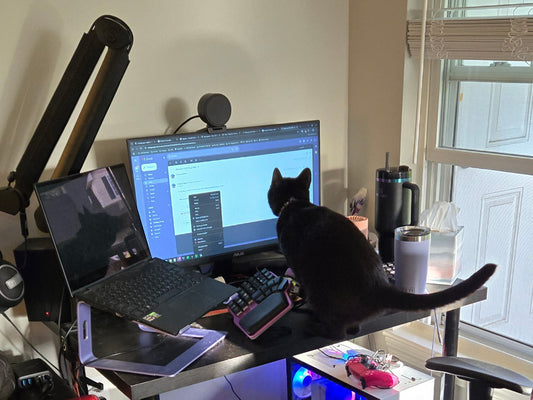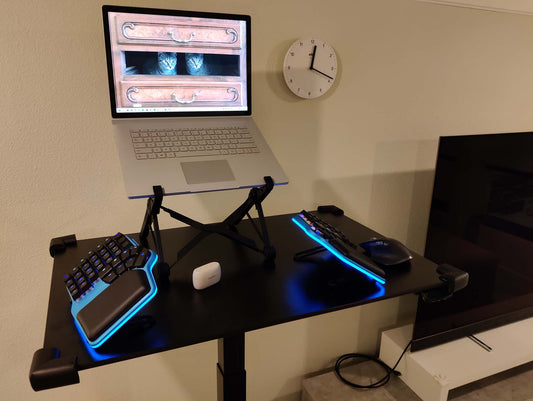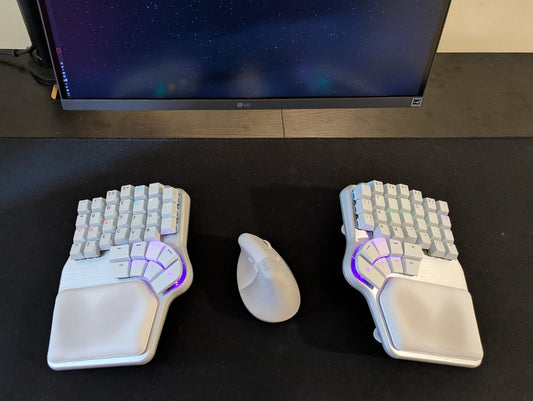We have some awesome news! 🤩

See Manel’s happy face?
Yep, we just signed the Purchase Order and paid to have all the components for the Raise manufactured. We have officially started the process of building 2,000 units of the Raise keyboard! The mass production phase has begun!
Let’s take a moment to feel excited….

What’s next?
Yes, these are exciting times. But we also want to break down the different stages of mass production so you all have a clear understanding of what’s coming next.
It’s not going to be smooth sailing, although we do hope we won’t have any major issues. But it’s important that we’re all on the same page as to what exactly is happening with mass production.
We've learned more about this process now that we're finally here and there’s a lot to understand! The different stages are equally important and some might require more time than others.
First stage: Sign, pay, and order the components from all the different suppliers. Remember, the Raise has more than 20 different components made by different factories.
Check out this video of Matt and Manel giving us a tour inside the factories during their trip last October 2018.
Second stage: Each factory manufactures the component assigned to them. Some of the factories have already started. They are creating 2,000 units of the following:
- PCBs
- Neuron - plastic base
- Neuron - metal cover
- Keycap-switch puller
- Cables
- User manual
For the rest of the components, we are making the final negotiations with the factories to make sure they manufacture each component with all our specifications. We did a few modifications after the DVT and created a very detailed QC inspection document for the factories to strictly follow.
Third stage: Do the IQC (Incoming Quality Control) of all the components and stock them in our assembly factory:
- Top panel - left and right
- Base
- PBT keycaps
- ABS keycaps
- Special keycaps
- Metal joint cover - left and right
- Metal pins
- Palm pads - left and right
- Cables
- Mylar sticker
- Neuron - plastic base
- Neuron - metal cover
- Stabilizers
- Magnets
- Screws
- Rubber feet
- Keycap-switch puller
- LEDs
- Cherry switches and Kailh switches
- Travel case
- And many more….
Fourth stage: Do the pre-production assembly where we will assemble 100 units of the Raise. The goal in this stage is to make sure the assembly line is working properly and check that all the workers understand their part. All the quality control steps inside the assembly line should be working (for example, checking the switches work, flashing the Neuron, etc). We need to make sure everything is working properly so we can move on to the mass-production assembly.
Fifth stage: Do the OQC (Outgoing Quality Control) of the 100 Raise keyboards. In this stage, we will check all the units and draw out a percentage of how many did not pass our specifications. In doing so, we can determine how many keyboards we would need to check when we do the OQC for the remaining 1,900 units.
Sixth stage: Do the mass-production assembly where we will assemble 1,900 units of the Raise.
Seventh stage: Do the OQC (Outgoing Quality Control) of the 1,900 units.
Eighth stage: Shipment.
🚢✈️📦🏠🤩
Factors to bear in mind
We also need to consider certain factors that are beyond our control.
Peak months for manufacturers. The months of September and October are the peak months of manufacturing in China. Because Christmas is approaching, all the factories are working double-time to meet their deadlines. This might cause some delays but we hope our suppliers don’t push our production to a later date.
1-week National holiday in China. The first week of October is a National holiday in China. So this means that our factories won’t be working.
US-China political situation. Because of the political situation between the US and China, there were a few changes made with the exportation fees from the US to China.
What does this mean?
1. Components are more expensive. We might need to increase the price of the Raise once pre-sales end.
2. Shipping from China to the USA might be more expensive. This means that we may need to ship the keyboards to Spain first, then to the US. This will increase the overall cost of shipping Raise keyboards to the US, where most of our customers are from.
We still aren’t clear with the full situation. We are talking to an international trade expert to see if this is really a problem for us. If it is, we will find solutions to avoid delays and to not charge extra costs to any backer.
Next trip to China
Manel plans to go to China as soon as all the components have been created so he can be part of the quality control checks as well as be there during the assembly. If necessary, Manel will go twice, during the IQC, and during the mass-production assembly and OQC.
Firmware and Software Updates
BIOS. In the last update, we talked about how some testers had problems with the BIOS of their computer not working with the Raise. Some old BIOS versions don’t work with NKRO USB reports, only with the older Boot Protocol reports. Our firmware already supports a toggle switch to choose which report is used. Our solution is to provide a macro key in the Dygma configurator software that will enable users to toggle between versions.
Updating the Firmware. Now we can update the firmware through the configurator software. This means that if we want to add more cool stuff to the keyboard, such as adding new light effects, we can do it remotely in the future.
ISO/ANSI Detection. We were able to fix this detection bug.
Things we are currently working on:
- Making sure installers work for all operating systems. The current version supports Windows 10, Mac OSX, and Linux.
- Improving the UX of the configurator software

- Macros
- Making the configurator software language-aware. As of now, the software shows English characters. Special characters such as ñ, ø, å, etc, are still not visually represented.
- Ability to create, delete, name, and move layers. As of now, the configurator only supports 3 layers.
Other business updates - hiring
Hiring people for multiple positions has been challenging. We are taking our time to properly learn about the different roles, skill sets, as well as costs of the positions we need.
We apologize if we haven’t answered many of you who have enquired. We still need more time to learn about all these roles related to our needs.
We have been receiving help from friends who run companies and have been through the same process. We’ve done interviews with agencies and individuals in the digital marketing, branding, web development, and eCommerce sector. We hope to have a decision for our next steps in the following days.
That’s all folks!
Thanks for reading our update! If you have any feedback or questions, you know what to do. Just write it down in the comments section below!
Till next time!
- Dygma Team
:)









